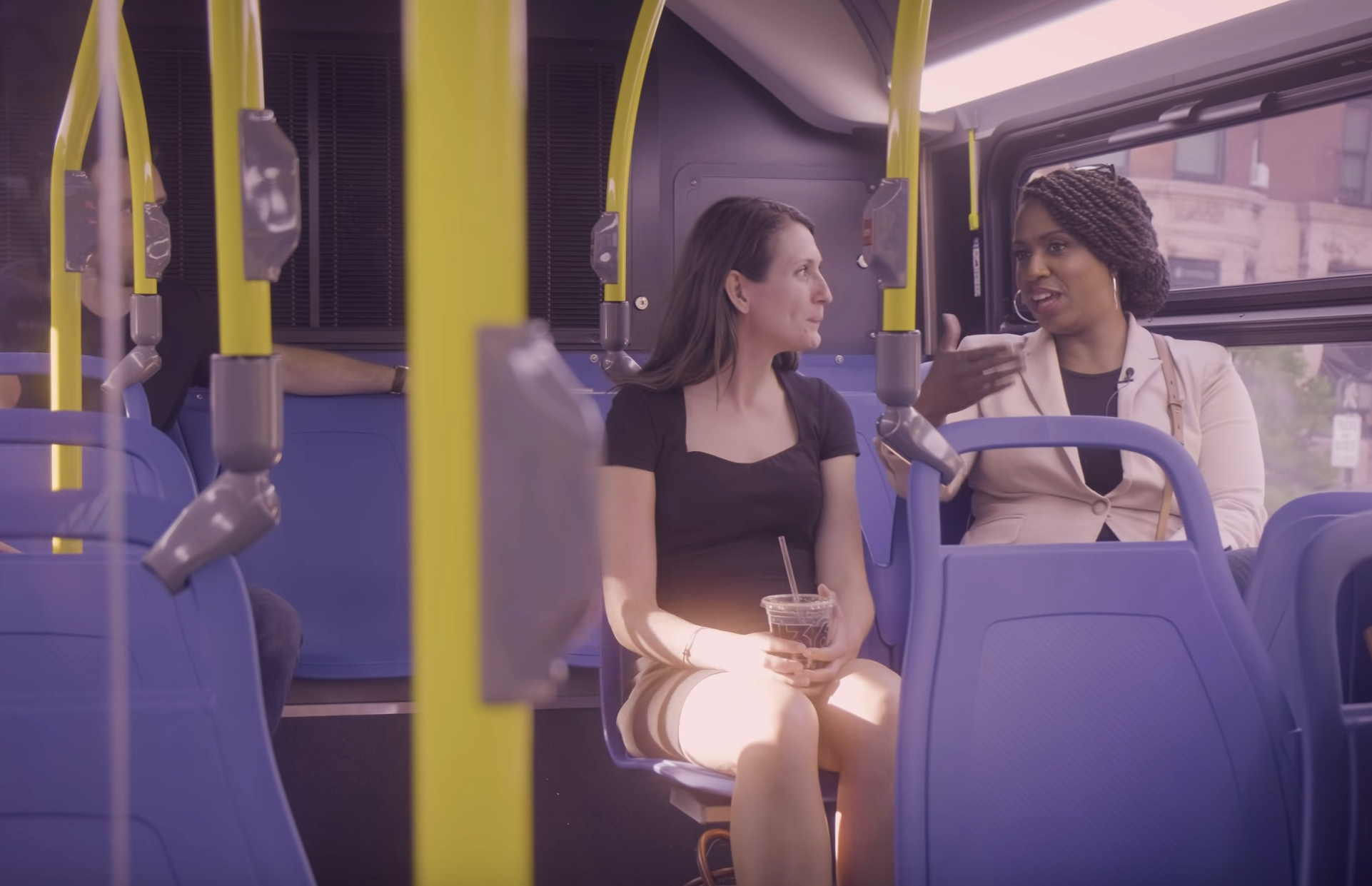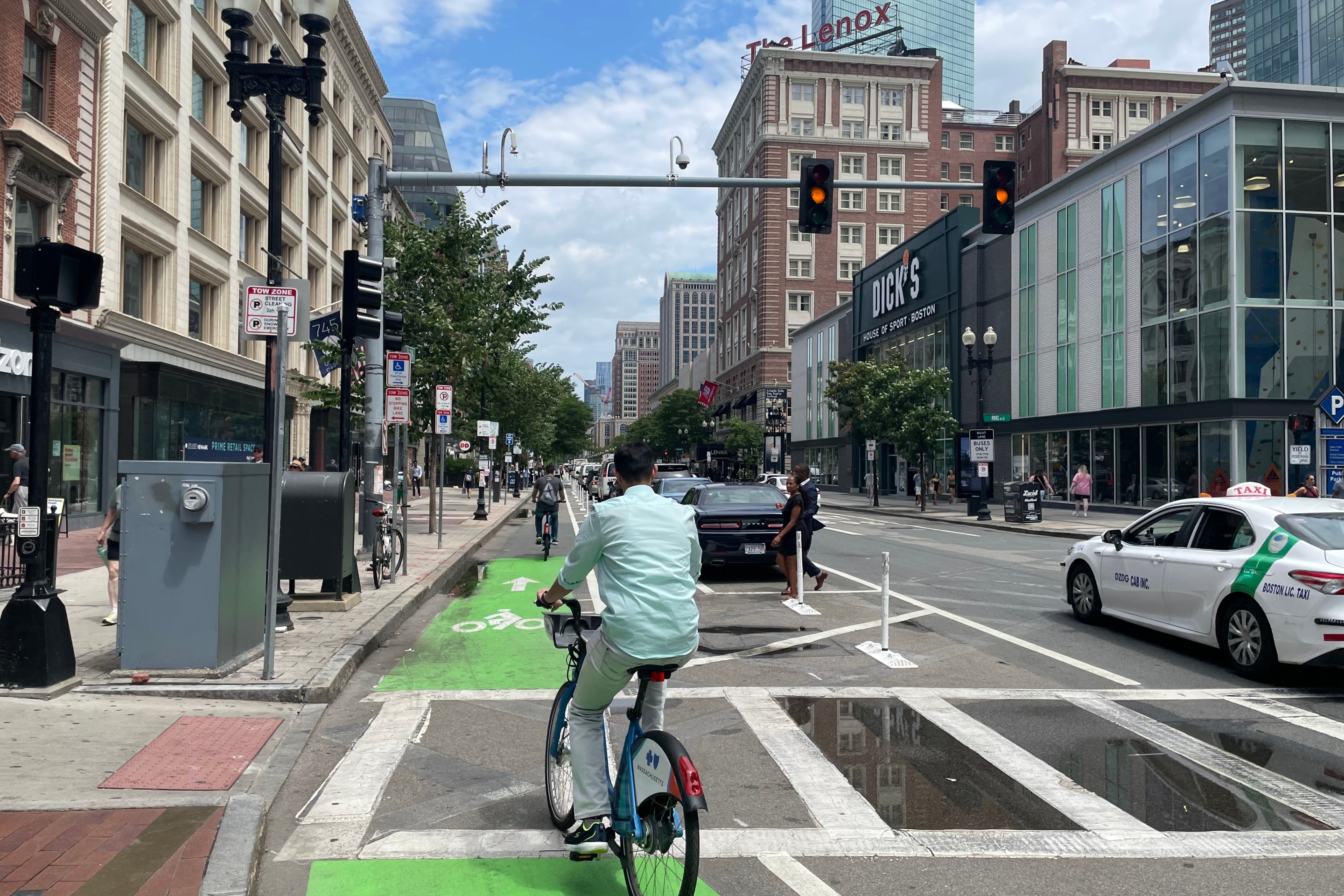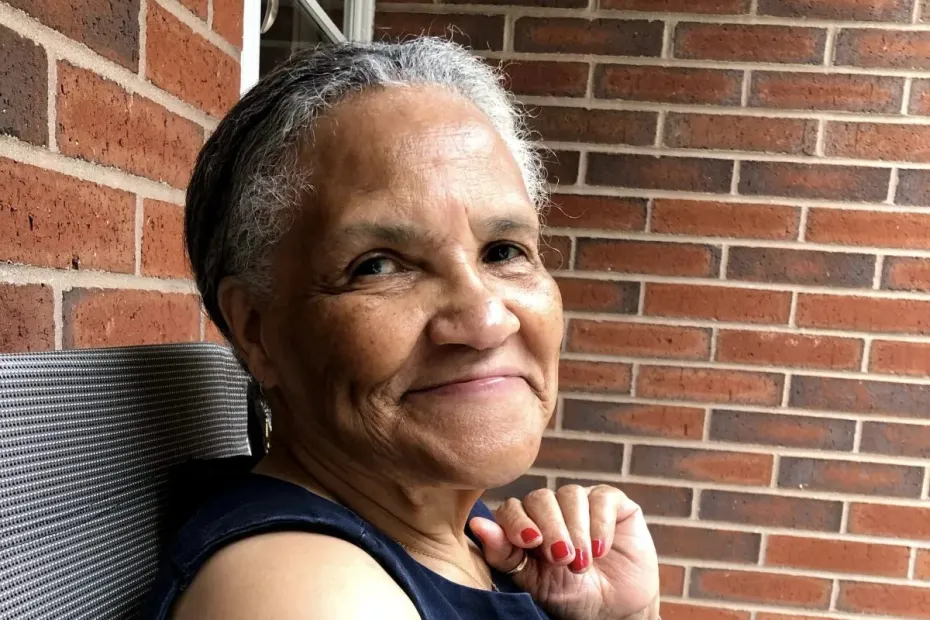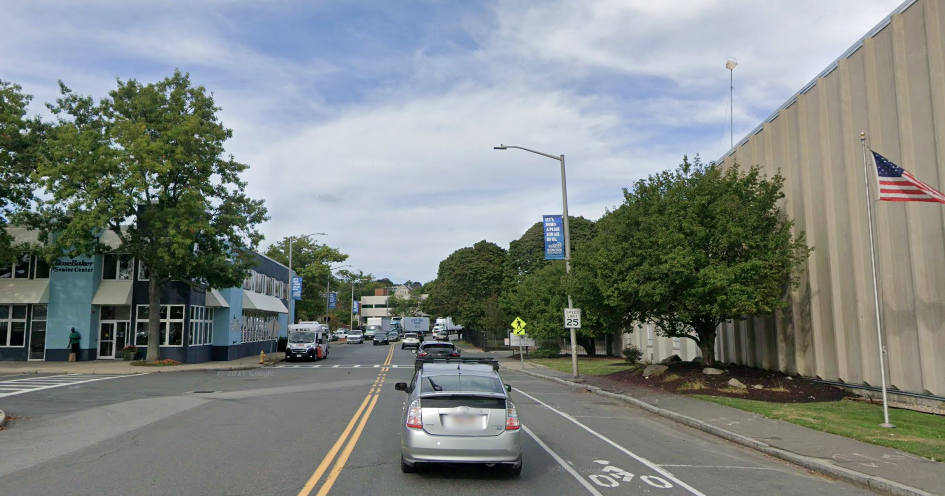In Massachusetts, election season is in full swing. Fifty-five cities and towns in Massachusetts are holding their biennial municipal elections November 4th of this year. See if yours is one of them.
But successful political campaigns understand that progress does not begin (or end) on election night.
Cambridge Bike Safety, a volunteer group of residents who advocate for safer street design and infrastructure to build a safe bike network for people of all ages and abilities, has emerged as a strong force in Cambridge’s elections.
But the group has earned that influence with years of organizing between elections, delivering testimony at public meetings, knocking on doors, starting petitions, hosting community events, and simply put, showing up.
In Cambridge, one of just two municipalities in the entire state that uses a ranked-choice voting system (though Boston, Bedford, Falmouth, and Concord may not be far behind), the race for nine city council spots is on, and Cambridge Bike Safety recently made their endorsements for the City Council candidates who will best support those who get around town by bike or on foot.
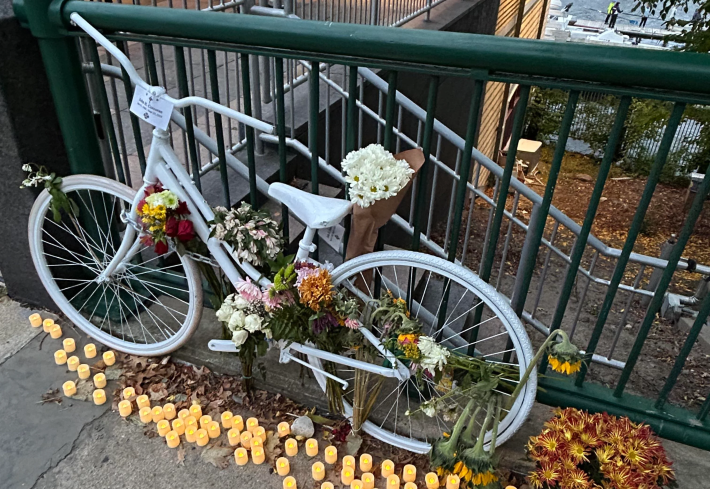
How Tragedy Inspired a Movement
Cambridge Bike Safety was born out of tragedy. Following two cyclist deaths in 2016 of Amanda Phillips in Inman Square and Joseph Lavins in Porter Square, longtime volunteer Chris Cassa explained, “we wanted to make sure that kind of tragedy never happened again.”
The group reaches across the community intersectionally, with over 10,000 subscribers to their email list and a wide range of volunteers, like Catherine Benedict and Maggie Baratz, who came to the group from different walks of life and with experiences.
“Cambridge Bike Safety is a group of volunteers working to make Cambridge a safer place for people who walk and bike,” says Benedict.
“It’s a real intergenerational movement,” Baratz said. “You have 20-somethings, parents with kids, and people in their 70s who rely on their bikes every day.”
Benedict, a 27-year old communications professional living in Cambridge who does not identify as a biker, came to the group following the death of her friend, Minh-Thi Nguyen, who was struck by a truck driver in June of 2024 while biking to her lab at MIT. Her loss compelled Benedict to get involved with CBS, at first speaking at a City Council meeting against bike lane delays to now supporting the group’s communications and outreach efforts.
Baratz, a 41-year-old full-time professional and mother, found herself and CBS in the same orbit due to a reversal on promised changes on Garden Street to add protected bike lanes. After the City considered going back on the one-way traffic pattern that provided space for those bike lanes, she took to the streets and gathered over 700 signatures for her petition to keep the plans in place.
The group regularly engages with the Cambridge community, hosting events like last week’s “What to Do if You’re in a Bike Crash” panel and others teaching people how to talk to their families about bike safety.
CBS also often meets the community where they’re at as well, exemplified in their appearances at every Cambridge Public Schools’ back-to-school nights, giving away bike lights, reflectors, and other safety materials to students, caregivers, school staff, and more.
Now, as election season gets into full swing, the group’s energy has consolidated and shifted towards the upcoming local election on November 4th. Their charge? Accountability.
CBS is committed to ensuring that the city completes the Cycling Safety Ordinance’s connected network of protected bike lanes by 2026, and supporting the candidates who plan to see the work through.
The 'Cycling Safety Ordinance'
The history of the Cycling Safety Ordinance (CSO) is a complex one, highlighted by community activism, bureaucratic red tape, and how to find compromise among competing interests.
In 2015, the City released its first Bicycle Plan (an updated plan was released in 2021), which outlined a 20-25-mile network of protected bike lanes throughout Cambridge. While aspirational, this plan didn’t have a legal mandate, and a lack of political will hindered progress.
In 2019, following years of advocacy and tragedy, the City Council passed the first Cycling Safety Ordinance, which required the city to build protected bike lanes on specific high-priority streets during reconstruction projects.
“We pushed for a goal of completing at least two miles of bike lanes each year, leading to the Cycling Safety Ordinance – a first-in-the-nation law requiring protected bike lanes whenever streets are reconstructed,” said Cassa.
The pace for this work was originally two to four miles of protected lanes added a year, but this timeline was not necessarily enforced.
“We realized that streets only get reconstructed every 50–75 years,” Cassa explained. “If we waited, the network would never be complete. So we created a timeline – about three to four miles per year for seven years – to get it done by 2026.”
In 2020, advocates successfully lobbied the City Council to pass an amended Cycling Safety Ordinance that required the city to build out its network on a specific timeline, whether or not those streets were slated for major reconstructions.
With legally-mandated deadlines in place, work picked up some steam. Garden Street. Then Brattle. Segments along Mass Ave., Hampshire, and Cambridge Streets.
But with increased progress came increased opposition, particularly from small business groups and residents concerned with the idea of loss of parking. An opposition group, Cambridge Streets for All, tried (and failed) to sue the City twice to delay or stop projects entirely.
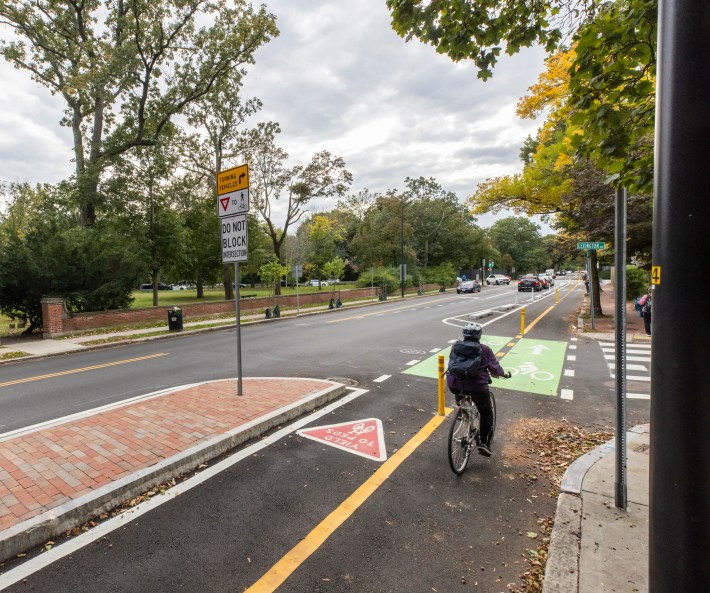
A narrow 5-4 vote in 2023 that rejected another effort to delay the CSO timeline was something of a turning point in the journey to safe streets, proving how consistent advocacy keeps the city on track to support the will of the people.
As of this fall, the city has installed roughly 20 of the 25 planned miles of protected lanes.
“It’s really working,” said Cassa. “We’ve seen three and a half times more kids biking to school, and Bluebikes use has grown 28 percent year over year.”
To only further support the case for safe streets, according to Cambridge Transportation Department data summarized in CBS reports, corridors with completed lanes are seeing a reduction in bicycle-related injuries.
However, a few key corridors like the remainder of Mass. Ave. and other north-south connectors remain unfinished.
Vice Mayor Marc McGovern reflects on what’s to come next.
“Moving forward, we need to focus on north–south connections, improve public transit, and do a better job educating people on safety standards and rules of the road,” McGovern told StreetsblogMASS.
Now, in order to see this work through, and on-time, CBS is canvassing voters before the November 4th election to support candidates who will keep the timeline on track for full competition by November of next year.
Cambridge's Bike Champions
Out of the twelve candidates, Cambridge Bike Safety has identified seven “Bike Champions”, or candidates who “not only pledged to complete the bike network on time,” but who also gave the “strongest responses on transportation policy in the candidate questionnaire,” and, if they were incumbents, they had a “perfect voting record” on bike safety.
“Our goal is accountability,” Cassa said. “It’s not enough for a candidate to say they care about bikes – we want to know they’ll follow through and complete the network.” Baratz expanded, detailing how the endorsements were “based on vote records and strong questionnaire responses.”
In a city where the council can set the agenda, but implementation comes down to the city manager, Cassa says that it’s “crucial to elect leaders who will follow through.”
Benedict praises city leaders who show empathy and engagement, like Vice Mayor Marc McGovern who reached out to her after the vigil for Minh-Thi and continued support of safe streets.
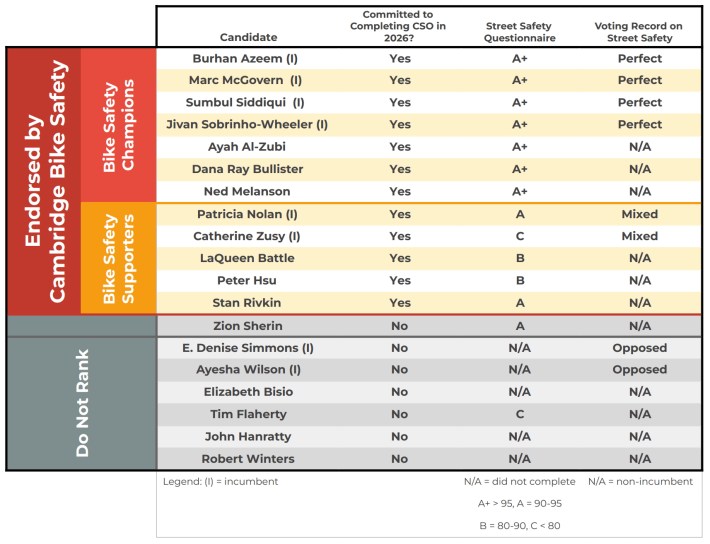
Intersectionality is key when looking at local politics, and most of the CBS-endorsed candidates committed to bike safety are also endorsed by A Better Cambridge, a pro-housing group.
Earlier this year, the current city council voted 8-1 to legalize multi-family housing citywide, highlighting how interlinked these policies, priorities, and outcomes truly are.
In Conversation with Candidates
Vice Mayor Marc McGovern, one of the seven Bike Champions endorsed by Cambridge Bike Safety, told StreetsblogMASS that he’d already been involved in advancing cycling safety for years when Cambridge Bike Safety formed.
“I was the lead sponsor on the Cycling Safety Ordinance,” McGovern boasted.
He says that “tremendous progress” has been made, shown in how crashes are down, and ridership is up. Despite this, he still feels the resistance in the community from those trying to repeal the progress made, which he is not negotiating on.
Councilor Jivan Sobrinho-Wheeler’s commitment to safe streets is personal.
“I lost part of two teeth in a bike crash in Cambridge,” Sobrinho-Wheeler recalls. As a city councilor, he introduced the 2020 Cycling Safety Ordinance during his first term, and is running for re-election in part to keep the work going and to “keep the majority on the City Council for safer streets.”
For McGovern and Sobrinho-Wheeler, the priority is clear: protected bike lanes save lives in more ways than one.
Sobrinho-Wheeler explained how streets that are “dangerous, noisy, and clogged with traffic” don’t benefit anyone, and instead looked to the symbiotic relationship between all road users that safe streets provide. “Streets that have bus lanes and signal priority are safe for pedestrians and cyclists,” resulting in “less traffic on the roads for residents who need to drive and businesses that depend on deliveries.”
“Safety is important for obvious reasons,” McGovern said, “and increasing (bike) ridership is important for environmental reasons,” as reducing carbon emissions will ensure a healthier, inhabitable earth for future generations.
McGovern describes his work with Cambridge Bike Safety as a partnership. “We educate each other. We advocate together,” he said.
“The relationship between policymakers and advocates is very important,” he said, as the connection between organized advocacy and responsive policymaking continues to shape how the city reimagines its streets.
A perfect example of this is how the community-led push for bike lanes led to council-level action in the development and follow-through of the CSO.
Your Vote Matters
As noted in the Fitchburg Crossing Project update story, there is a real opportunity at the state and local level to address and fill gaps left by the federal government in progressing equitable, evolving policy.
However, McGovern highlighted how voter turnout in Cambridge actually tends to lag, and Sobrinho-Wheeler corroborated McGovern’s assessment of voter turnout, seeing local elections often decided by only a “handful of votes.”
But they encourage public participation because, as McGovern put it, “issues like transportation, development, and public safety directly impact how we move through our city every day.”
Sobrinho-Wheeler believes that voters have agency and ownership over the “tangible things” that surround them every day – “street design, affordable housing and zoning, support for public transportation and after-school programs.”
“Local elections may not be as sexy as national ones,” McGovern said, “but the decisions we make locally make a significant difference in residents’ daily lives.”
And this sentiment is shared the other way around by advocates as well.
“I never thought local politics mattered to me,” Benedict said. “But after losing my friend (Minh-Thi), I realized that change starts right here at the city council level.”
The voter registration deadline for all Massachusetts elections on Tuesday, November 4th is on this Saturday, October 25th. To register for the Cambridge city election, visit the city’s website.
